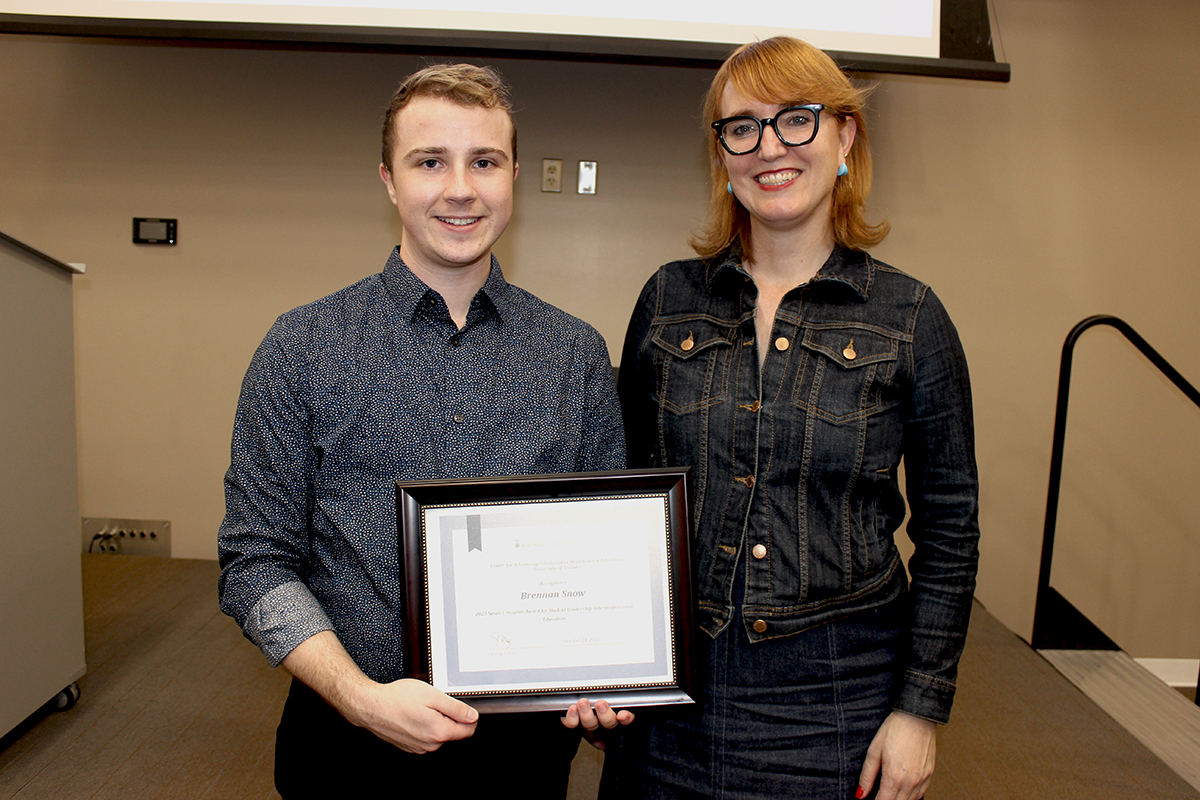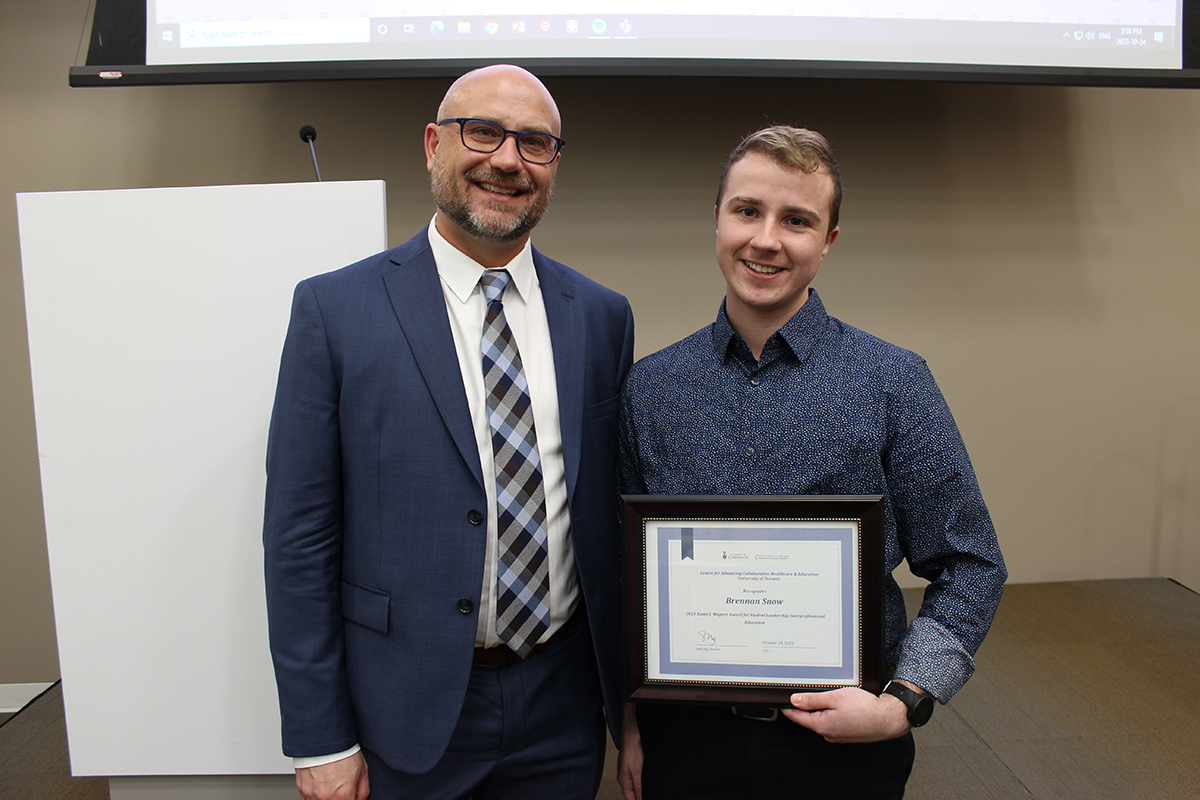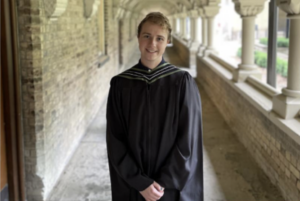Master of Social Work graduate Brennan Snow recognized for his leadership in interprofessional education
Categories: Awards & Recognition, Students
Brennan Snow and FIFSW Associate Professor Rachelle Ashcroft
Recent MSW graduate Brennan Snow was selected as one of the recipients of the 2022-2023 Susan J. Wagner Student Leadership Award in Interprofessional Education by the Centre for Advancing Collaborative Healthcare & Education (CACHE). He received his award on October 24 at Toronto Western Hospitals BMO Conference Centre.
CACHE is a strategic partnership between the University of Toronto and the Toronto Academic Health Science Network (TAHSN), with the University Health Network (UHN) as lead hospital. The Centre provides U of T students who are pursuing a professional degree in a health-related field with the opportunity to participate in an Interprofessional Education (IPE) curriculum that prepares them to collaborate with colleagues across disciplines in both university and practice settings.
The Susan J. Wagner Student Leadership Award honours a U of T student who demonstrates leadership, dedication and excellence through promotion and engagement of interprofessional education and care. As a student at the Factor-Inwentash Faculty of Social Work, Snow was co-president of the Interprofessional Healthcare Students’ Association (IPHSA) and involved in promoting IPE within the Faculty.

Associate Professor Micheal Shier and Brennan Snow
In its announcement of the award, CACHE shared that “Brennan has demonstrated leadership, enthusiasm and engagement promoting interprofessional education in his interactions with other social work students and the health profession student body more generally. Brennan has jumped into opportunities to promote IPE within the faculty. As a student facilitator, speaker, and leader Brennan has demonstrated exemplary commitment to mentorship and role modelling.”
After graduating from FIFSW in the spring of 2023, Snow returned to Women’s College Hospital as a summer research assistant. (He also had a summer research position at Women’s College Hospital as a student the year before.) While there, he contributed to an environmental scan of gender affirming surgery policies in Canada. (Read Women’s College Hospital’s Q&A with Snow here.) This Fall, Snow moved to Ottawa where he is now working in housing and communities policy at Infrastructure Canada. This new role — in an interprofessional workplace — draws on his past experience doing research related to the social determinants of health and policy as well as his Master of Social Work degree and undergraduate degree in human geography.
“Brennan is incredibly deserving of this award for his work not only to promote the benefits of participating in U of T’s IPE curriculum, but also to highlight and advance how interdisciplinary health care teams can work together to improve care,” says Associate Professor Rachelle Ashcroft, who along with Associate Professor Keith Adamson, is FIFSW’s faculty lead/representative for the IPE Curriculum. “Social workers have an important role to play in strengthening team-based primary care, which has received increased recognition in recent years for its potential to better serve clients. We are so proud to see a social work student represented among the winners.”
Students across U of T’s 11 Health Sciences programs (including dentistry, medicine, medical radiation sciences, nursing, occupational science and occupational therapy, pharmacy, physical education & kinesiology, physical therapy, physician assistant, social work, speech language pathology) participate in the IPE Curriculum and are eligible for the award.
Snow was spotlighted in the summer edition of CACHE’s magazine, Together. FIFSW has reprinted Snow’s article on his experience with the IPE Curriculum, below.
IPE Student Spotlight — Brennan Snow
Originally published in Together, an international magazine by the Centre for Advancing Collaborative Healthcare & Education (CACHE)
 My name is Brennan, and I’m a recent University of Toronto Master of Social Work graduate (June 2023). Over the past couple of years, I have been involved in interprofessional education (IPE) as Vice President (VP) External and Co-President of the Interprofessional Healthcare Students’ Association (IPHSA), as a student facilitator for learning activities, and through a few other longitudinal initiatives (such as the Senior Interprofessional Projects).
My name is Brennan, and I’m a recent University of Toronto Master of Social Work graduate (June 2023). Over the past couple of years, I have been involved in interprofessional education (IPE) as Vice President (VP) External and Co-President of the Interprofessional Healthcare Students’ Association (IPHSA), as a student facilitator for learning activities, and through a few other longitudinal initiatives (such as the Senior Interprofessional Projects).
Social workers work in a very broad variety of fields, and so the first year of our program takes a more generalist approach before we focus on a specific area in our second year. I was initially drawn to IPE in part because I knew that I was interested in health, and was eager to learn more about the role of social work within healthcare teams and systems. I think having this context from my involvement in IPE really set me up to hit the ground running in my second-year hospital practicum, with some knowledge of scopes of practice, roles, and interprofessional collaboration to build from.
I also gained skills and experience from IPE that I didn’t necessarily expect – I have learned so much about communication, respecting and learning from different perspectives, the importance of supporting each other, and collaborative leadership. Student facilitation opportunities in particular gave me a chance to practice facilitation skills I was learning in class, while also getting to learn with and from other students. This was especially true when the content of the learning activity was relatively new to me – I always learned something new, or saw something differently because of our conversations.
After p articipating i n a n umber o f I PE i nitiatives, getting to see and participate in collaborative healthcare in practice solidified my learning. I feel grateful to have had incredible supervisors in my practicum, but also the opportunities to learn from and work with wonderful teams in both of my practicum rotations at Sunnybrook this year, in the inpatient Schulich Heart Program and in General Internal Medicine on C4. While we learn about why interprofessional collaboration is important in IPE, experiencing it in practice, and hearing first-hand from patients about what a difference it makes when it feels like their team is working together, truly underscores its importance.
To me, transforming care through collaboration is about building relationships and implementing creative and appropriate solutions together, with the aim to improve care for all involved. By this I mean relationships with patients and their family systems, between and within the immediate healthcare team, but also even beyond that – for example, with the folks who work in patient flow, patient accounts, and in hospital leadership, in community organizations and support services, with the barista at Second Cup, and with policymakers. Any of these people could interact with or make decisions that impact patients either directly or indirectly, and all have expertise you may one day need to best support a patient. Working in (or adjacent to) healthcare also has its current and ongoing systems-level challenges, and we know that burnout rates are high. I really believe in the importance of supporting each other to make this work sustainable and fulfilling, and to provide excellent, creative, and transformative care.
What’s next for me after graduating? This summer, I am working as a research assistant at Women’s College Hospital on an environmental scan about gender affirming surgery policies across Canada. I’m really interested in the intersections of direct healthcare practice and policy/systems, and passionate about equity-based approaches to both. I will be relocating to Ottawa in September, and as I begin my career there, I hope to continue to integrate these interests and passions into my work.
Student voices: How the Interprofessional Education (IPE) Curriculum at U of T benefits social work students
FIFSW Master of Social Work Students share their experiences participating in U of T’s Interprofessional Education (IPE) Curriculum through the Centre for Advancing Collaborative Healthcare & Education (CACHE). U of T’s IPE Curriculum offers students enrolled in a professional health program, such as social work, nursing, occupational therapy, or medicine, the opportunity to build knowledge and develop collaborative skills to effectively serve patient needs as a member of an Interprofessional health care team. Master of Social Work students can enroll in a variety of IPE activities over the course of their degree, including talks, workshops and simulations.